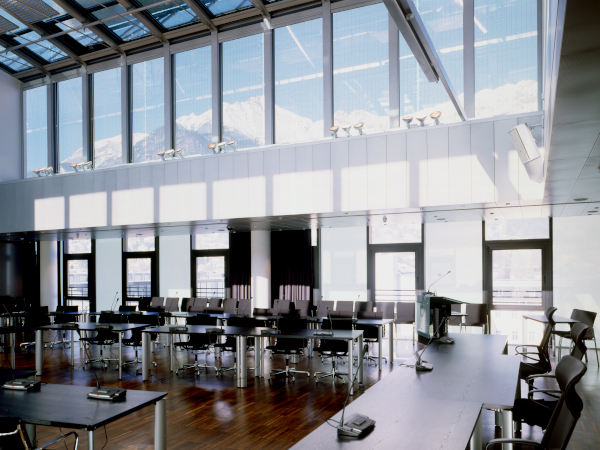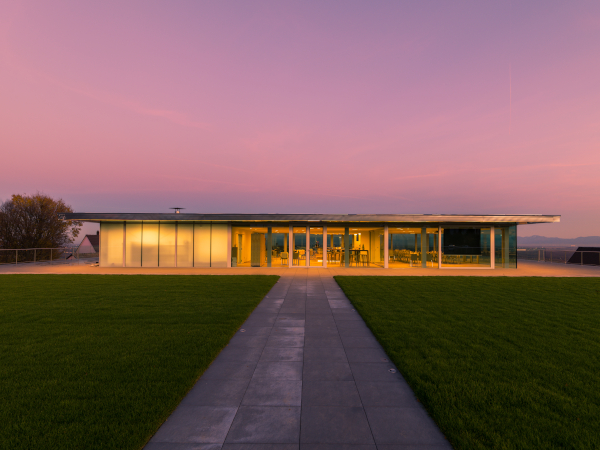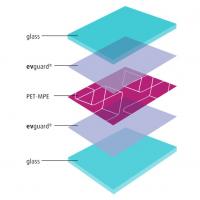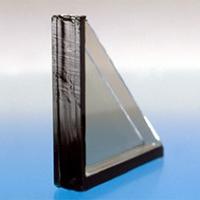
Date: 9 May 2016
That being said, every Cornell University “Big Red” fan on the four-level building’s south side gets a season-ticket view from their 160-square-foot offices. Between games, first-year CIS Ph.D. students get the best view of all – northwestward across campus to a sunset-lit Cayuga Lake.
Welcome to Cornell University’s Gates Hall Computing and Information Science (CIS) Building, the home of cutting-edge computer technology. It’s not a coincidence that the Bill and Melinda Gates Foundation, who donated $25 Million for this latest campus addition, has their name on this building.
Since information sciences is a highly creative and innovative field, the University wanted a nontraditional design to inspire faculty and students alike. Curved lines intersecting with linear angles and lots of glass and light were paramount – not just in the common, collaborative spaces but also in every office, lab, and teaching space.
It was critical that everyone who works in computer computation and graphics have bright, open spaces where ideas can flow.
Morphosis’ design director and Pritzker Architecture Prize-winner, Thom Mayne, paid close attention to address the University’s needs.
Early in the design process, began in 2012, he promised CIS faculty and students a space “to capture and express the dynamic and transformative power of the discipline it houses.” $42 million worth of construction later, general contractor Welliver (formerly Welliver McGuire Inc.) and a skilled cast of subcontractors, including one of the nation’s leading glazing contractors W&W Glass, completed the project in late 2014.
W&W Glass was part of the design-assist team to help optimize materials and details with the project team to make sure the University and architect got what they wanted within budget.
W&W used Erie Architectural Products’ custom structurally-glazed, high-performance unitized curtain wall with outriggers connected directly into steel within the vertical aluminum mullions to support custom perforated metal panel systems supplied by Zahner.
Upon closer inspection from inside, the panels function as more than just an exterior decorative screen. While remaining very transparent, they still provide shading for occupants from the sun and also some foul ball protection due to the close proximity to the field.
This is just one of dozens of green design features that are expected to help the building earn a LEED (Leadership in Energy and Environmental Design) “Gold” rating.
.jpg)
Photo Credit: www.azahner.com
The professionals at W&W Glass had to be just as creative and inventive as the future students and faculty. The high-performance, structurally-glazed thermally-broken curtain wall system consisted of roughly 600 unitized frames and 35,000-square-feet of glass.
The prefabricated unitized curtain wall system was erected first, with anchor plates and panel assemblies being installed onto the facade in the field afterwards. The main challenge with the system was in the design and coordination of connections and panel assemblies.
Zahner and W&W worked very close with the architect to make sure the panels did not overlap and run into each other. Zahner did an excellent job of helping to rationalize the panel assemblies to reduce variations to a limited number of panel sizes with most modifications kept to stand-off lengths and angle of tilt on the panels.
Some other scope areas that posed challenges were the serpentine curved insulating glass eye-shaped entrance and the offset cylindrical interior digitally-printed structural glass wall. The curved entrance had to be laid out very carefully to accommodate the proper splay with patterned-shaped insulating glass units.
The orange fritted laminated glass cylinder was four-sided silicone butt-glazed like other walls inside, but presented an engineering challenge for layout. W&W used Rhino modeling software to help better understand the complex shapes that need to be fabricated. Since this was a Design-Assist project, W&W worked together very closely with the project team and vendors to try and resolve many conflicts up front before there were issues in the field. This was imperative to the success of the project.
“It’s our job to inspire students. Bill and Melinda Gates Hall is a real game-changer for Cornell’s Information Science Department,” said Haym Hirsh, Dean of the Faculty of Computing and Information Science. “Being in one location will facilitate research collaboration – and expand and strengthen the educational experience that we provide our students.”
When people think about innovative, but functional architecture utilizing high-performance glazing systems, W&W Glass, LLC seems to shine through with custom design solutions. W&W and Morphosis are teaming up again on their next Cornell University project at the new Cornell NYC Tech campus’ First Academic Building on Roosevelt Island. Stay tuned for more details in the future.
W&W Glass LLC is a family owned business with a 70-year history in the metal and glass industry, one of the largest metal and glass companies in the New York metropolitan area and the largest supplier of structural glass systems in the country.
We have over two decades of experience in the design and installation of various building enclosure systems, including stick-built curtain walls, pre-glazed unitized curtain walls, Pilkington Planar™ structural glass facades, and custom metal and glass enclosure systems. We install all of our work with our own dedicated union labor force. W&W is consistently the largest employer of glaziers in the NY metropolitan area.
 600450
600450



























Add new comment